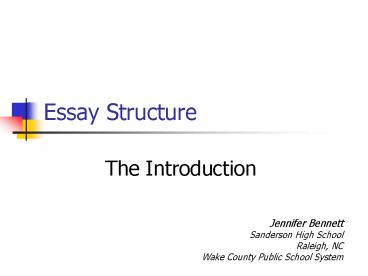Essay Structure - PowerPoint PPT Presentation
1 / 13
Title:
Essay Structure
Description:
Essay Structure The Introduction Jennifer Bennett Sanderson High School Raleigh, NC Wake County Public School System Essay Structure Basics Three Parts: Introduction ... – PowerPoint PPT presentation
Number of Views:834
Avg rating:3.0/5.0
Title: Essay Structure
1
Essay Structure
- The Introduction
Jennifer Bennett Sanderson High School Raleigh,
NC Wake County Public School System
2
Essay Structure Basics
- Three Parts
- Introduction
- Tell audience where youre going to take them.
- Body
- Take them on the journey.
- Conclusion
- Remind them where theyve been and why this
journey was meaningful.
3
A Little More Detail . . . Introduction
- Purposes
- To introduce topic and purpose of essay
- To capture the audiences attention and draw them
in - To set the tone of the essay
4
A Little More Detail . . . Introduction
- Logical progression general ? specific
General Opening
Specific Thesis Comment
5
Opening the Intro. Paragraph
- Begin with . . .
- An interesting, relevant quotation
- A challenging (rhetorical) question
- A general statement relating to your topic
- A specific fact or statistic
- An anecdote that illustrates your topic
6
Opening the Intro. Paragraph
- Begin with . . .
- a quotationsomething profound and generally
related to your topic - (Topic MLKs use of language in speech)
- Ex. Free at last, free at last, thank God
almighty, Im free at last! The most powerful
tool that King used to free his people was
language. - a rhetorical question
- Ex. How can language be as powerful a weapon as a
gun?
7
Opening the Intro. Paragraph
- Begin with . . .
- A general statement
- Ex. The evils of segregation were the catalyst
that ignited the powerful flames of Martin Luther
Kings rhetoric. - A fact or statistic
- Ex. One hundred years after the Emancipation
Proclamation, the evils of segregation still
infected American society. - Ex. On August 28, more than 2,000 buses, 21
special trains, 10 chartered airliners, and
uncounted cars converged on Washington.
8
Opening of the Intro.
- Begin with . . .
- An anecdote a brief, relevant story that
- captures the readers interest, drawing them into
your essay (everybody loves a story!) - illustrates the spirit/idea of the thesis,
leading readers to down to it - sets the tone and mood for the rest of the paper
9
Example of an Anecdote
- . . . it was pitch dark, maybe 400 in the
morning. We were coming down from the north and
we cross over this big bridge, I think it might
have been the bridge over the Susquehanna. . . .
There had been all this stuff in the newspaper .
. . some were in total panic mode Call out
the National Guard! Alert the 101st Airborne!
Close the liquor stores! Hide the white women!
Evacuate the children to the countryside! It was
like they thought the Mongol hordes of Gengiz
sic Khan were descending on the nation's
capitol to rape, ravage, and pillage. - Michaels, Shiela. Interview Bruce Hartford.
February 2002. Veterans of the Civil
Rights Movement. lthttp//crmvet.org/nars/bruce1.ht
mgt. 6 October 2010. - How do I connect this story to my thesis??
- Instead of fearing physical violence, the
newspapers should have been more concerned about
the power of the now-famous words of Martin
Luther King, Jr. that shook the foundations of
American society.
10
Connecting
- After your general opening statement, you need to
lead the reader to your specific thesis and
comment (the part of the thesis that lists your
main pts.). - Make logical connections between your opening and
your thesis, gradually becoming more specific.
11
Transitioning Sample Intro. Paragraph
- How can language be as powerful a weapon as a
gun? Most people would consider the analogy
ludicrous. Dr. Martin Luther King, Jr., however,
abhorred violence and did not consider it an
option in the war against segregation in
mid-twentieth century America. Kings most
powerful weapons were his words. In his I Have
a Dream speech, he artfully crafts his rhetoric,
using the power of metaphor, imagery, and
repetition to expose the evils of racism and
segregation and to inspire his audience to
immediate and enduring action against them.
12
How can language be as powerful a weapon as a
gun? Most people would consider the analogy
ludicrous. Dr. Martin Luther King, Jr.,
however, abhorred violence and did not consider
it an option in the war against
segregation in mid-twentieth century
America. His most powerful weapons were
his words. In his I Have a Dream speech,
King artfully crafts his
rhetoric, using the power of
metaphor, imagery, and
repetition to expose the evils of
racism and segregation and
to inspire his audience
to immediate and
enduring action
against
them.
13
The Concluding Paragraph
- Moves in the opposite logical direction of the
introduction specific ? general - Begin by restating the thesis (NOT using the same
wording). - End by moving outward to a general conclusion.































